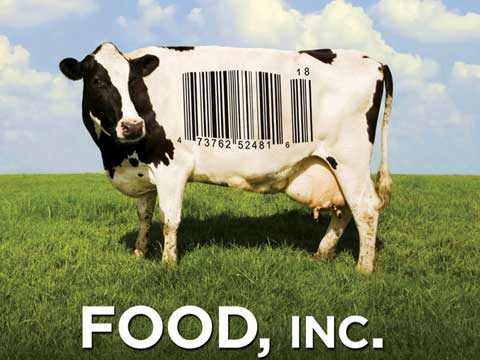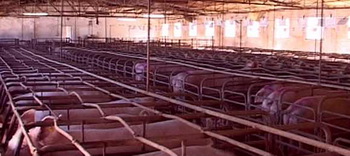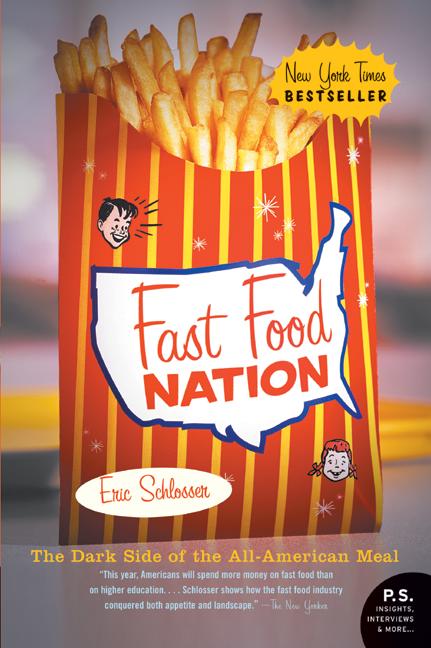![]()

It’s not just the Food, it’s the Inc.
In disenchanted America, muckraking documentaries are hot box office. After Michael Moore blazed the trail, the food-related films McLibel, Supersize Me and Fast Food Nation followed. The latest, Food Inc., has topped them all—immediately after the DVD was released on Amazon, it even outsold the Hollywood blockbusters. And now it's up for an Academy Award.
Most of the discussion about the film on both sides of the Atlantic has centered on nutrition and animal welfare, but the sub-plot goes beyond food production and consumption to the very heart of the country’s legal and political structure. Says director Robert Kenner in an interview for The Ecologist:

I realised it was not a film about food, it was a film about rights. Seeing how food products now have more rights than individuals - that was more frightening than seeing how the food was produced.
This point seems to have escaped reviewers in Britain, many of whom complained that the film only told them what they already knew. But the real message lies in the tightrope that Kenner had to walk in order to convey the information:
I realised the system was off limits. Ultimately in the US food products have started to have more rights than individuals. There are laws in place to protect companies - known as 'veggie libel' laws - that stop you from insulting a product or endangering profits of a corporation. . . I ended up spending more on legal fees on this film than the past 15 films combined - times three!
Some reviewers, together with establishment organizations such as the Farmers’ Union, also dismissed the film as American scaremongering, but Kenner is firm in his rebuttal:
This is not a film about the US. I thought of filming in other countries and you could have been told the exact same story. It might have started in the US, but it is spreading. It's starting to happen here and it happens in Asia.

In fact, the American industrial pig farmer Smithfield has opened plants in Romania and Poland that legally export to all of the EU (as documented in another scary documentary, Pig Business). And then there are all those thousands of Indonesian chickens that end up in everybody’s fast food lunch. As for the legal aspects, Kenner was well aware that Britain is a world centre of “libel tourism”:
The irony is that it's more frightening to talk about it here than in the States.
Huge success in America has helped to launch the film in Britain with an impetus it would not otherwise have had. This is not just another foodie TV programme following in the footsteps of Jamie Oliver and Hugh Fernley-Whittingstall, but a feature film that will continue to be seen by millions on both sides of the Atlantic, both in the cinema and on DVD.
 Early attention was virtually assured by Kenner’s brilliant decision to ask Eric Schlosser and Michael Pollan to jointly narrate it. Both have long been at the top of the best seller list of campaigning food books and both were so lacking in vanity and greed as to readily accept equal billing. Their only complaint, Kenner said half-jokingly, was that they weren’t given a script but had to put it in their own words. Their veracity comes across in a direct and spontaneous delivery that never smacks of the teleprompter.
Early attention was virtually assured by Kenner’s brilliant decision to ask Eric Schlosser and Michael Pollan to jointly narrate it. Both have long been at the top of the best seller list of campaigning food books and both were so lacking in vanity and greed as to readily accept equal billing. Their only complaint, Kenner said half-jokingly, was that they weren’t given a script but had to put it in their own words. Their veracity comes across in a direct and spontaneous delivery that never smacks of the teleprompter.
Whether the film will have a lasting effect is another matter. In a recent American documentary, Daniel Ellsberg tells the sensational story of his leaking of the Pentagon Papers to the New York Times. Its saddest moment is when he says that one of the lessons he learned about his fellow countrymen came when, even after they had learned that President Nixon (like Presidents Johnson and Kennedy before him) had repeatedly lied to them about the Vietnam War, they resoundingly re-elected him. As Santayana wryly remarked, “Those who cannot remember the past are condemned to repeat it.”
©2010 John Whiting
The entire film, with Hebrew subtitles, can be seen HERE on YouTube.